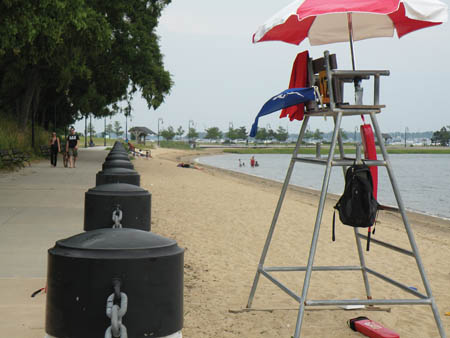July 6, 2011
 The blue flag flying from the lifeguard station at Savin Hill beach last Thursday indicated that the water was safe for swimming. But Dorchester’s three beaches— Tenean, Malibu and Savin Hill— have yet to draw the summer crowds that are now regularly seen
The blue flag flying from the lifeguard station at Savin Hill beach last Thursday indicated that the water was safe for swimming. But Dorchester’s three beaches— Tenean, Malibu and Savin Hill— have yet to draw the summer crowds that are now regularly seen
A recent national water quality survey indicates that Dorchester’s beaches are experiencing some of the lowest levels of contaminants in decades.
According to the National Resource Defense Council’s annual “Testing the Waters” report, released earlier this month, Dorchester’s Malibu, Tenean, and Savin Hill beaches were closed 20 percent less often in the 2010 season due to bacterial contamination compared to 2009. Additionally, recent sewage system infrastructure improvements in South Boston have many local conservationists hopeful that swimming in the neighborhood will become safer than ever.
The NRDC report is based on samples taken from beaches nationwide at either daily or weekly intervals to determine the presence of bacteria that could potentially infect swimmers. Bacteria is typically introduced to the water when heavy rainwater runoff mixes with sewage lines and drains out to the coast, forcing officials to shut down a beach for at least 24 hours after a large storm.
Save the Harbor/Save the Bay spokesman Bruce Berman said the report’s findings are a culmination of years of conservation efforts in the area, as well as an effort by the state government to diminish the level of contaminated water released into the harbor.
“Less than 25 years ago on a rising tide, anything that came out of Deer Island and Nut Island [sewage treatment plants] was dumped directly into the harbor,” Berman said. “It got pretty gross…and stretched from Cape Cod to Cape Ann.”
While Berman said the closure of the Nut Island facility in 1997 was a vital conservation move, he also said the recent completion of a 2.1 mile-long sewage interceptor tank built by the Massachusetts Water Resources Authority in South Boston will go a long way toward ensuring that local beaches remain safe for swimmers regardless of the weather.
The $225 million project was completed in late June and is meant to hold 19 million gallons of wastewater during storms for processing, thus preventing the water from overwhelming Boston’s sewage treatment plants and spilling directly into the local surf.
“We’re already beginning to see the benefits,” Berman said, highlighting a June 26 storm that dumped an inch and a half of rain on the city but did not shut down some of the beaches in South Boston and Dorchester now served by the MWRA tank.
Despite the promising findings in the NRDC report and infrastructure improvements, Environment Massachusetts clean water advocate Ben Wright believes that 2010’s relatively dry summer months may have skewed the report.
“Frankly, the weather was better last year compared to 2009,” Wright said. “We had less rain, causing less runoff and contamination.”
Rather than accepting current runoff rates, Wright called for the state to reevaluate the distance maintained between paved areas and wetlands that, once contaminated by chemicals picked up by rainwater, travel downstream toward the Boston Harbor.
Although Dorchester’s beaches have become considerably cleaner in recent years, Savin Hill beachgoer Steven Gillies referred to the stretch of sand and surf as “comfortably underutilized,” while noting the small group of about 20 swimmers and sunbathers in the area on Sunday. Gillies and his friend, Virginia Pratt, said they had been aware of Savin Hill beach for years after Pratt studied at UMass Boston, but had only begun to explore the area after learning about successful cleanup programs earlier this year.
Reek Mills of Adams Street was out on the beach with his family earlier this week and said that the peace and quiet of Savin Hill Beach is one of the best qualities of the area. “I like this beach because it’s cool, calm, and collected,” Reek said. “It’s better than Carson Beach to bring our kids out, there’s none of the craziness you see over there.”
In the wake of the State’s conservation efforts, Columbia Savin Hill Civic Association president and self-described “avid beach user” Maureen McQuillen said her organization has always valued the neighborhood’s beaches but is putting a renewed effort into raising awareness.
Thanks to a $2,500 grant from Save the Harbor/Save the Bay, McQuillen and fellow civic association member Paul Nutting are currently organizing a family movie night in late August to encourage additional use.
“I think they’re well-known in the neighborhood and it’s definitely a factor for a lot of people coming here,” said McQuillen, who chose to move to Dorchester in part due to the area’s beaches. “We’re really proud that our urban beaches are some of the cleanest in the area.”


